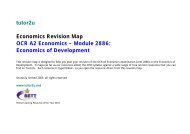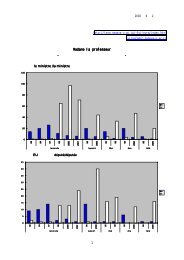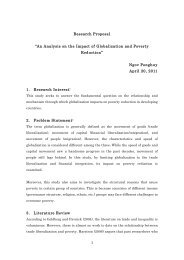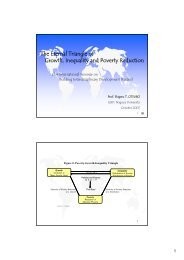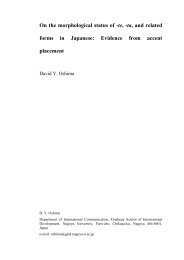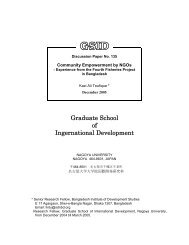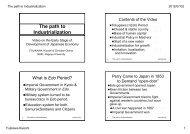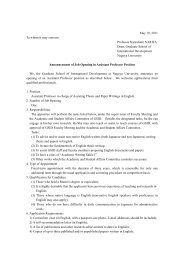Report
Report
Report
You also want an ePaper? Increase the reach of your titles
YUMPU automatically turns print PDFs into web optimized ePapers that Google loves.
110 QUANTIFICATION OF BENEFITS FROM ECONOMIC COOPERATION IN SOUTH ASIA<br />
Some large sophisticated firms are also present in<br />
the construction sector that compete internationally due<br />
to specialisation and cost effectiveness, especially in the<br />
Middle East. The comparative advantage of these firms<br />
mostly lies in cheap skilled and unskilled labour, and<br />
experienced engineers who have previously worked for<br />
multinational companies in Pakistan or abroad. Two<br />
most significant factors that are linked with the success<br />
of these companies are (a) acceptability of engineering<br />
qualifications of engineers educated in Pakistan and<br />
(b) unrestrained flow of temporary movement of<br />
natural persons. If Pakistan is to gain from the ongoing<br />
negotiations in the Doha Round then its stand in the<br />
construction sector should be built around these factors.<br />
Since Pakistan’s comparative advantage lies in cheap<br />
labour and its pool of experienced professionals,<br />
Pakistan may not be able to effectively compete on<br />
foreign turf in the absence of Mode 4 clause while<br />
service providers from requesting Members are likely<br />
to gain from this clause.<br />
State of Liberalisation<br />
Market access for commercial presence is fairly open<br />
to bid for government contracts. In this regard, several<br />
Chinese public or private sector companies, Turkish<br />
companies and Korean companies have from time-totime<br />
operated in construction or civil engineering works<br />
(Burki and Hussain 2007: 26). Entrance of foreign<br />
construction and engineering firms has enhanced<br />
competition in their bid for mega projects. Moreover,<br />
various foreign companies of the Middle East or South<br />
East Asia origin are also involved in developing real<br />
estate projects in association with some Pakistani<br />
companies due to joint venture restrictions.<br />
Ironically, the study suggests that the policies<br />
relating to construction services come from various line<br />
ministries, departments and regulatory bodies. For<br />
example, the Ministry of Works is mandated to oversee<br />
most construction and engineering related legislation<br />
and to initiate policies after interministerial<br />
consultations. However, the Pakistan Engineering<br />
Council (PEC) is the regulatory body established by<br />
the Act of Parliament of Pakistan in 1976, which<br />
regulates engineering education, gives certification to<br />
professional engineers and advises government on all<br />
engineering and construction related issues. Moreover,<br />
all construction and engineering related firms are<br />
required to be licensed by PEC to operate in the country.<br />
PEC registers constructors and operators into three<br />
categories namely, C1, C2 and C3, which are based on<br />
the minimum paid-up capital requirement indicating a<br />
firm’s sound financial and technical capacity. From<br />
more than 24,000 constructors and 88 operators<br />
registered with PEC, only close to 600 qualify to the<br />
C1 category (largest contractors/operators) on the basis<br />
of a benchmark of Rs.20 million average annual value<br />
of work undertaken during the past three years. The<br />
foreign engineering consultancy service providers are<br />
also subject to the regulations of PEC.<br />
The Pakistan council of architects and town<br />
planners (PCATP) is another governing body established<br />
by the government to regulate the profession of<br />
architecture, which not only sets standard of conduct<br />
for its own members, but also advises government on<br />
architectural issues facing the industry. Even though<br />
there are no solely owned foreign architectural firms<br />
in Pakistan, JGC-Descon is a joint venture company of<br />
Descon Engineering with a leading Japanese company<br />
geared up to produce engineering and architectural<br />
designs for the global market. Foreign architectural<br />
firms seeking market access into Pakistan are subject<br />
to the condition of registration with PCATP.<br />
At another level, the construction and architectural<br />
services are subject to the by-laws of local governments.<br />
Hence each city district development authority has its<br />
own independent regulatory body to regulate construction<br />
plans and designs in their jurisdiction. But, there<br />
is no consistency in rules and regulations across cities<br />
due to lack of coordination between the federal and<br />
local governments. In addition to the above, the<br />
national highway authority is mandated to regulate<br />
construction of highways and elevated highways all<br />
over the country. Further, the Pakistan housing<br />
authority in the ministry of works formulates policies<br />
for the development of housing industry.<br />
In sum, the study suggests that construction work<br />
processes are generally too primitive and they need to<br />
change as soon as possible. Current regulations<br />
governing construction, engineering and architectural<br />
engineering services have several tiers. These regulations<br />
are highly diversified and their implementation is mostly<br />
lax in nature. Pakistan needs to revamp its multi-tiered<br />
regulatory framework in construction, engineering and<br />
architectural sectors before this sector is ready to cope<br />
with the risks of liberalisation.<br />
Pakistan’s regime is typical of those countries that<br />
have a federal structure. Although many of the<br />
limitations emanating from this kind of system may<br />
take a lot of time and energy to remove such limitations,<br />
what could be immediately done is to take wider and<br />
deeper commitments in construction and all related<br />
professional services. In this regard, particularly





